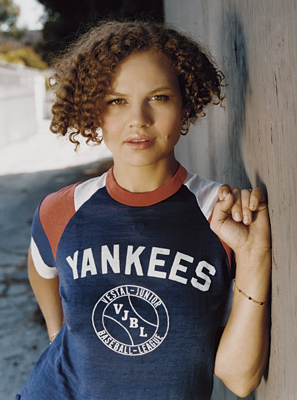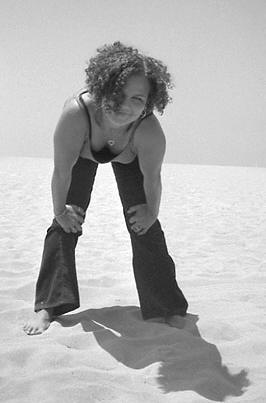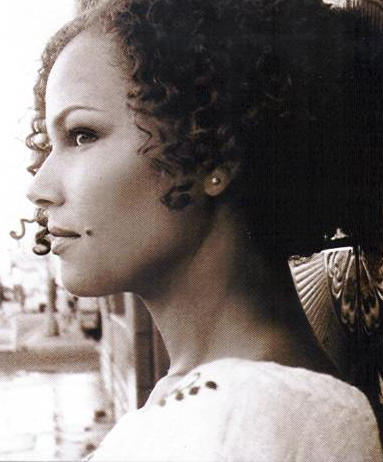

PopEntertainment.com
> Feature Interviews - Music >
Feature Interviews A to E >
Alana Davis
 Alana
Davis
Alana
Davis
Surrender To Her
by Jay S. Jacobs
Copyright ©
2005 PopEntertainment.com All rights reserved.
Posted: March 30, 2005.
As the daughter of African-American jazz pianist Walter Davis,
Jr. (sideman to Charlie Parker, Dizzy Gillespie and others) and white chanteuse Anamari, it may have been inevitable that Alana Davis
gravitated towards music. She went to the high school of Music and Art
in the funky neighborhood of Chelsea in New York City, being exposed to more
cultural and musical shadings. Her background also probably explains Davis'
eclectic and varied tastes in her music -- her songs straddle all styles and
tempos to create a wondrous gumbo of sound; a little rock here, a little
soul there, a pinch of the blues and a soupcon of folk.
Davis' 1997 debut, Blame It on Me was a
surprise success, giving her a radio hit with her reworking of Ani
DiFranco's "32 Flavors." With the popular and critical success of the
album, it looked like she was going to be a huge star. However,
her second album, Fortune Cookies, became an
overlooked gem; again scoring rapturous reviews but not getting the public
recognition of the debut.
After the disappointing sales of her follow-up,
Davis
decided it was time to make a happy separation from the major label world.
She has
started her own record imprint, Tigress Records, on which she has now
released her third album. Surrender Dorothy has been getting
the same ecstatic reviews that her previous disks garnered. She sat
down to tell us about her new album and her career.
You grew up in a musical family. Did you always
know you were going to get into music?
I guess in some way I did know, but I had no
real ambition to be a star. To me music wasn't a career choice, it was
simply a part of life.
You have an
extremely strong voice, but I've noticed that you have a tendency to
downplay a lot of the vocal theatrics, unlike so many artists who often
oversing in this American Idol world, emulating Mariah Carey and
Christina Aguilera and such. How do you know when to reign it in?
That's a nice thing to
say, thank you! I really am more about the flow of the music than I am about
theatrics. I don't think of music as a place to massage my ego.
It is much more of an id thing, you know? What is
best for the music is where my head is usually at.
I enjoy singing loud and riffing and all that, but I don't think gymnastics
really has a place in music. That is a whole other
kind of "look what I can do"
singing. It just isn't where I come from.
Your 1997 debut
album ended up being a pretty sizable hit and "32 Flavors" became a Top 40
single. As a young artist, what was it like to gain such notice?
Quite a ride, as you
can imagine. I think I got the impression that you put out a song and it
becomes a hit, which is a nice way to feel, but not necessarily how it
generally goes. That was an exciting way to begin my journey in the
business, though, because I guess I have always felt my songs had a real
chance of being on the radio and becoming hits, whether that is always the
case or not. The positive outlook and expectations have never gone away, and
so I write with a general sense of confidence, which I think is a real gift
to possess in this business considering the real odds of having a hit.
Believing in yourself is at least half the battle, if not the whole thing!
You are a respected
songwriter, but is it kind of weird to you that to this day the song most
people know you for is "32 Flavors," which is an Ani DiFranco song?
Yes, in some ways. But anyone who knows my history and my writing knows I
wrote parts of that song I never took credit for – like the chorus, for example.
That section did not exist in the original recording. Though that song is
technically a cover, I put myself and my lyrics and my musical sensibility
in it as I do with any cover. I
wrote the bassline and programmed the drums.
And so, when I perform that song, or when you listen to the album version,
you are listening to a hybrid of the original. I don't think you can hear my version and feel like you are listening to
Ani's song anymore. You
have to listen to her recording to get her vibe.
Mine is a
different animal, don't
you think? Regardless of what the credits are, know thyself!
And I do.
can hear my version and feel like you are listening to
Ani's song anymore. You
have to listen to her recording to get her vibe.
Mine is a
different animal, don't
you think? Regardless of what the credits are, know thyself!
And I do.
Your second album,
Fortune Cookies, garnered even more critical acclaim than the debut.
Were you disappointed that it did not get the same type of notice?
Yes, in some ways I felt
like I baked a big beautiful cake for a friend and they never got to have a
piece – they never even cut into it! But
at the same time, a lot was going on (9/11, for
one thing) that made the process very different. It is too easy to become
bitter in this business if you take yourself too seriously.
The truth is, a record lasts forever and this one did come
out. You can get it. When a
person discovers me, they will discover that record.
Hopefully the fact
that it is a few years old won't matter.
It will get to be new to them.
Music is timeless, I would say.
So though I might have liked to have a
big birthday party where everyone attended and fell in love with the cake at
once, in actuality, it still has the opportunity to reach the same number of
people. In the meantime, I will just keep baking more cakes.
Was the lack of backing
from Elektra on Fortune Cookies the reason that you decided to leave
the label?
Not really. Every
record that came out that year on Elektra fell subject to "lack of backing¯,"
so I couldn't take that too personally.
What I did begin to realize as my style developed, was that they did not
seem to want me to have my own sound.
They seemed to want me to blend in and
just have hits, which just isn't why I make music. If it isn't about an
individual thought, or at least an
honest impression, one that attempts to be unique, well then it isn't music
for me. I began to feel like we wanted different things from
my career and I just wasn't going to back down on where I saw my music going. I knew it was bigger than me and bigger than them.
So that is more why
I left, because we began to play tug of war with the direction of the music
and you know, music really has a direction of it's own. I wanted to just get
out of the way and get on with the journey.
Less calculating, more flowing,
you know?
Surrender Dorothy is
the first album you have released independently after being on a major
label. How is that different? How is it better? In what ways is it
harder?
Well it is different in
every way, ultimately all better, I would say. Though there are less people
on the team, the people I have are dedicated and devoted and we are all on
the same page, so no tug of war! Additionally, though there are a lot more
nuts and bolts I must consider, from choosing singles to hiring independent
firms for publicity and promotion and the like, there is also a real sense
of purpose now, one that no one can sway me from. Finally music is as open
and free as I always saw it being, my career can now go back to being my
life instead of my job. Yes, all consuming, but so very satisfying.
It has taken about
four years between each of your three albums. Why do you think it takes so
long to bring an album to life?
Well, so far each
record has come with it's own set of issues and obstacles to overcome. The
first record was the first record and you only make that once, so it took
time – The second record had some of that tug of war involved and some
switching of directions which ultimately made the process take a longer than
it could have. And this record contained the change from major label to
creating my own independent home for the music, so that took it's own time
to cultivate as well. From this point on, however, I do not foresee the
music taking so long to get out. I think there is finally space to create
without so much issue, every stage requires time to transition, but I think
the ball is rolling more freely than ever now.
It won't be another four
years this time! That said, I am a Taurus, and I do not concern myself too
much with doing things quickly, I am more concerned with doing them well. So
if it takes four years, well I promise it means I have made a better record
than I would have in two. How's that for a promise with a disclaimer?
 Musically,
I love the fact that the album goes into all sorts of interesting styles and
directions. For example, on the new album, "The Benefit" is very much a
rock song, "Vision" and "Jaded (Goodbye)" are funky, "Wide Open" and "The
Reaper" are a bit folky, "Letter" is pop and "Right There" is very soulful,
and yet the guitar line in that same song almost feels country/western. Do
you look to experiment with styles when writing, or is that something that
comes naturally to you?
Musically,
I love the fact that the album goes into all sorts of interesting styles and
directions. For example, on the new album, "The Benefit" is very much a
rock song, "Vision" and "Jaded (Goodbye)" are funky, "Wide Open" and "The
Reaper" are a bit folky, "Letter" is pop and "Right There" is very soulful,
and yet the guitar line in that same song almost feels country/western. Do
you look to experiment with styles when writing, or is that something that
comes naturally to you?
I am a hybrid. I think
I am variety personified and music that I create is an extension of that,
so it must just my thing. It troubled Elektra, I think, that I would not
marry myself to one style, but who the hell wants to write the same song
over and over again? Well, okay, lots of people do that, but certainly not
all of us have to conform to that standard. If someone doesn't go out on a limb every now and then and just try
something without worrying first about what they might lose, then nothing
can be gained and music will never grow; and it simply MUST grow. That is
our job as musicians: to try and push the envelope, push communication and
broaden thinking. I try to create mystery for myself with every song,
otherwise it bores me and I am not inspired to create. That's just me, I
like variety – and as I said, I am variety – Welcome!
Do you think your
upbringing affected this wide-ranging musical taste?
Sure.
I grew up in a very music filled, open-minded household where every day
would hold it's surprises. Musically, I guess I was lucky to hear as much
jazz as I did because I think I inherited the headspace, which is a very
free, very open thing. Anything goes in jazz, and it's kinda that way with
my tunes, too.
Despite the fact that
you have a wide range of influences, but you always give priority to having
a good tune. So many rappers and other artists these days feel that it's a
sell out to have a tune. Why do you think songcraft is making sort of a
comeback now?
A sell
out to have a tune? You mean like it's cooler to have a catchy thing with no
meaning? Well I missed the memo on that, but if songcraft is coming back
into favor then maybe it's because music that titillates and does not
communicate has gotten to be unsatisfying for the listener. There is a need
right now in our culture
to feel connected to something; maybe simple, truthful songwriting is just
easier to connect with? Maybe it is ultimately more fulfilling? Certainly
trends have to change and change and change –
I love the cover of
"(Don't Fear) The Reaper," and it's such an unexpected choice. What made
you decide to do that song, and do you tend to cover songs people might not
expect of you like "The Reaper" or "Friends" (a Whodini
single that she revamped on her second album)?
Well I
do not intentionally choose songs that seem unlikely covers, but I do tend
to gravitate toward material I can add my own perspective to. As a woman, to
sing a lyric "baby, I'm your man" is very liberating.
I just couldn't resist that one. And right now I am in such a period of
rebirth, the song just hit a chord with me. "Take
my hand/we'll be able to fly..."
Yes!
On the other side of
the coin, your song "Murder"¯ was sampled by Jay-Z. What is it like to have
your music used in that way? Does it seem odd to hear the tune in a
different context?
Well,
I love it! There is no higher form of compliment
than to have someone want to perform or cover your song. To me, the more
different from my recording the better! The sampling phenomenon is a craft
in itself, something that has forced a change in the sound of music. I was
flattered by the whole experience – Jay-Z, wanna do
it again? How 'bout sampling "The
Benefit"? I bet that could turn into a neat jam.
I remember when I was
in college; one of my writing professors said that if you feel inspiration,
you should lie down and wait for it to go away. He was one of these guys
who believed writing was more a job than a calling. I always thought that
was a bad attitude. Do you feel inspiration drives your songwriting and
playing?
Well,
I think that quote from your professor is one of the dumbest things I have
ever heard! Sounds like the kind of teacher I had a lot growing up,
uninspired people trying to deaden us right down with them.
Well if it weren't for inspiration I don't think there would be any
representation of magic in the world at all. Inspiration is the highest form
of human excitement. I think a life without
inspiration would be a sad life, indeed.
What bands inspired
you to take up music?
Hmm, I
guess Bad Brains and Siouxsie and the Banshees were probably the ones who
made me see that music could be special because it was different rather than
just because it was popular. Those bands meant a lot to me and neither of
them ever (in their heydays) conformed to the status quo.. I think they
INSPIRED me to do the same.
Who do you listen to
now?
Honestly I am listening to almost exclusively reggae right now. I think I
need to hear positive lyrics and soulful grooves to soothe me these days.
The histrionics and pyrotechnics in popular music
have become an unsatisfying bore to my ear, sometimes you just need to go
back to the roots. One love. One heart. Deep rhythm. That seems to be what
I need at the moment.
In the end, how would you like people to see your music?
As whatever they want it
to be, I think that's what music is – interpretive, personal. I just hope it
means something –
Are there any misconceptions you'd like to clear up?
No, misconceptions are a part of this business. And to expect
them is what makes us complex to figure out. If the picture isn't coming in
clear, then fine tune it. Meanwhile, the show goes on, whether there is snow
on your screen or not.
Well,
best of luck with the new album –
Thanks so much for talking with me.
It has been a pleasure.
Copyright ©
2005 PopEntertainment.com All rights reserved.
Posted: March 30, 2005.
Email
us Let us know what you
think.
Features
Return to the features page
